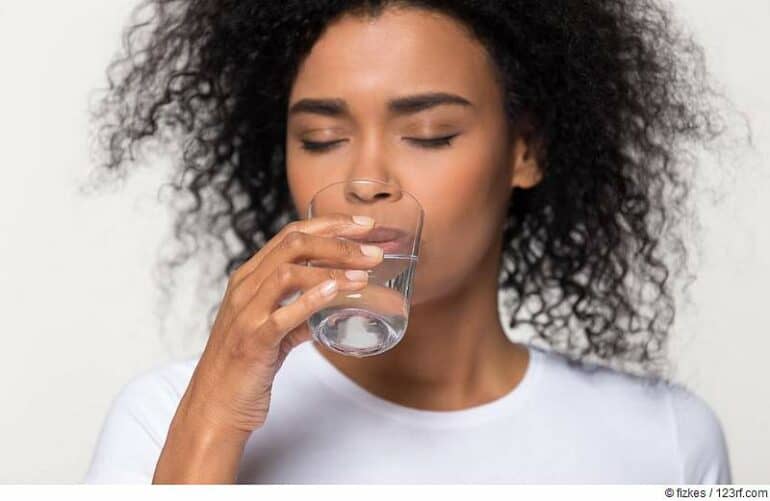Dehydration refers to the lack of fluid in the body
Dehydration can lead to a number of health problems and affect the body’s well-being. When the body is not adequately hydrated, it leads to impaired physical and mental performance. Symptoms of dehydration include fatigue, dizziness, headaches, difficulty concentrating, dry skin, decreased urine flow and dark urine.
Young children and the elderly are especially at increased risk for dehydration. Children have a greater body surface area to body mass ratio, which means they lose more fluid per unit weight than adults. The elderly often have a diminished sense of thirst and therefore cannot always properly assess their body’s fluid needs.
To prevent dehydration, continuous fluid intake is important. The recommended amount is about 1.5 liters of water per day, but may vary depending on individual needs. You should drink small amounts of water regularly rather than consuming large amounts at once. In addition, eating foods rich in water, such as fruits and vegetables, can help meet fluid needs as well.
In situations where increased fluid intake is needed, such as physical exertion, high temperatures, or certain illnesses such as diarrhea or vomiting, water intake should be increased accordingly. Electrolyte drinks are also helpful to compensate for mineral losses that may occur during intense physical activity or heavy sweating.
This is something that sauna users in particular should bear in mind
In some types of saunas, very high temperatures prevail during the sauna visit. The extreme heat causes the body to produce more sweat to cool down. This intense sweat loss leads to significant dehydration if the lost fluids are not replaced. Sweating in the sauna results in the loss of not only water, but also vital mineral salts such as sodium and potassium.
According to experts, even a 15-minute sauna session can result in a fluid loss of about half a liter. For longer stays or in saunas with higher temperatures, this loss is much higher.
To minimize the effects of dehydration during saunas, adequate hydration is essential. The Finnish Sauna Society recommends drinking 500 to 700 ml of water before a sauna visit. And after the sauna visit, one should compensate for fluid loss by drinking additional water or isotonic beverages to restore electrolyte balance.
A 2016 study examined the effects of sauna visits on the body’s fluid balance. The results showed that fluid loss from sauna sweating can be compensated for by adequate fluid intake. Study participants who drank sufficient water while in the sauna did not show significant loss of body fluid.
It should be noted that individual fluid intake may vary depending on factors such as body weight, temperature in the sauna and personal sweating behavior. It is recommended to pay attention to the body’s signals and drink sufficient fluids to avoid dehydration.
Our tip: Drinks that are enriched with electrolytes can quickly replenish the body’s mineral stores and even speed up recovery time.
| # | Preview | Product | Price | |
|---|---|---|---|---|
| 1 |
|
sanotact Elektrolyte Plus (20 Beutel) • Elektrolyt Pulver...* |
5,49 EUR
3,95 EUR |
Zum Angebot |
| 2 |
|
Raab Vitalfood® Elektrolyte Pur (170 g) - Elektrolyte ohne...* |
15,90 EUR
12,06 EUR |
Zum Angebot |
| 3 |
|
Powerbar - Isoactive - Red Fruit - 1320g - Isotonisches...* |
22,90 EUR
19,58 EUR |
Zum Angebot |
The negative consequences of dehydration during saunas
If you suffer from a lack of fluids (dehydration), it means that you have lost too much water, which can manifest itself through a number of symptoms:
- Headache
- feeling of tiredness
- Loss of balance
- Nausea
- Muscle pain
- Dry mouth and lips
- Clouding of the eyes
- appearance of dark circles under the eyes
- Weight loss
Always pay special attention to these symptoms of dehydration, and if you notice any of them, you should leave the sauna as soon as possible and drink plenty of water.
How do I avoid dehydration while taking a sauna?
To avoid dehydration while taking a sauna, you should consume one to one and a half liters of water throughout the day. Before going to the sauna, it is recommended that you drink at least half a liter of fluid. Make sure you have your water bottle with you so that you can replenish your fluid balance after leaving the sauna. If it is not possible for you to drink sufficient amounts of water, you can also drink other beverages such as fruit juices, soups and broths. On the other hand, you should avoid alcohol, as it does not hydrate you, but has the opposite effect.

